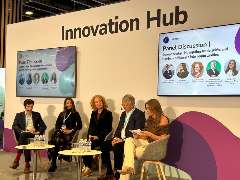News
A matter of taste: Using AI to speed product development
19 Aug 2019What if artificial intelligence could specify flavour preference in any given market? Several companies are using big data to do just that, and the trend is gaining ground.
Swiss start-up iSense, for instance, aims to simplify product development with an online tool that objectively maps flavour profiles. The idea is to provide a flavour search engine that will benefit flavour companies by providing them with greater commercial reach, while also benefiting food and beverage companies by allowing them to find precise flavour profiles more quickly, and to order samples from several suppliers at once. The company started in 2019 with strawberry flavours in June and vanilla flavours in August, and it expects others to follow as it gains market recognition, including citrus, butter, milk, cream, chicken and beef.

For food and drink makers, the tool aims to improve agility, cost effectiveness, and understanding of local tastes – all essential elements for market success. Currently, the system includes flavours from 17 global flavour houses, which are not granted access to the marketplace, while food and drink companies are not aware of the identity of the flavour house until after they have evaluated the flavour. The company aims to have 10,000 registered food and beverage company users by the end of 2021, and over 100 flavour houses.
Until recently, most company research into flavour preferences was based on data from trained sensory panels, but it is time-consuming and expensive. The digital approach to determining consumer liking is gathering momentum, and many ingredient suppliers and food companies already use some form of this to identify regional tastes. After all, providing an interface between artificial intelligence and flavour science could bring big cost savings for industry.
Tastewise is another company using big data to pinpoint consumer preferences and market opportunities. The Israeli start-up launched in February 2019 with its real-time analysis of food-related online activity in the United States, from social media posts, to restaurant reviews, photos and recipes. Its data suggest regional and nationwide areas where the market falls short of consumer interest. So far, it has identified a gap for fitness-related food in Denver, organic food in Philadelphia, and vegan food in Boston, among others.
Also in February 2019, US-headquartered flavour supplier McCormick ventured into artificial intelligence for product development through a partnership with IT group IBM. It brings together all of McCormick’s taste data and sensory science, which includes thousands of data points related to consumer preferences over more than 40 years. The aim is to increase consumer liking and slash new product development time.
As artificial intelligence increasingly is used as a tool to boost innovation, the relatively conservative food and beverage industry looks set to become more dynamic – and potentially more successful in its new product development – in the years ahead.
Related news

PepsiCo formulates ‘naked’ Cheetos and Doritos products
31 Dec 2025
US food giant PepsiCo has launched its Simply NKD range, a move it says reimagines its popular products with new formulations free from artificial flavours, dyes, and colours.
Read more
Debate over ban on ‘meaty’ names for plant-based products reaches stalemate
26 Dec 2025
The debate over a ban on plant-based products using “meaty” terms has reached a stalemate, leaving manufacturers in limbo and still facing overhauls to their marketing and packaging.
Read more
Has ‘clean’ had its day?
22 Dec 2025
Wielding clean-label positioning and fortification as marketing levers is a dangerous strategy, and brands would be better off explaining the hows and whys of the ingredients in their products, say experts.
Read more
Pioneers of circular plastic packaging push for new policies
18 Dec 2025
Some of the world’s largest food and drink companies have grown frustrated at investing in circular packaging systems, as the majority “wait on the sidelines”.
Read more
Whole Foods Market forecasts fibre frenzy for 2026
11 Dec 2025
Whole Foods Market has released its top 2026 trends, predicting that a fibre frenzy will take place next year as health-conscious consumers seek out nutritious, filling options.
Read more
Sorghum emerges as better-for-you hero ingredient
9 Dec 2025
With the launch of Novak Djokovic’s sorghum-based brand, the grain’s popularity in the better-for-you snacking sphere is on the rise, thanks to its nutritional and sensory properties.
Read more
Innovation promise in 'maturing' plant-based dairy alternatives market
8 Dec 2025
Plant-based dairy is a maturing market that still faces significant hurdles around taste, functionality, nutrition, and price, but industry is innovating fast, according to experts speaking at Fi Europe.
Read more
Turning global trade challenges into opportunities
4 Dec 2025
While our food innovation ecosystem is in a healthy place, certain barriers persist. A panel of experts at Fi Europe shared their ideas and strategies for overcoming these, to fully unleash Europe’s potential.
Read more
Celebrating the winners of the Fi Europe Innovation Awards 2025
3 Dec 2025
Food industry stakeholders celebrated as the winners of the Fi Europe Innovation Awards were announced at a ceremony in Paris.
Read more
Yuka’s food scanning app helps consumers make healthier choices
2 Dec 2025
Global food scanning app Yuka helps consumers understand the content of their shopping baskets and shapes producers’ reformulation plans.
Read more
